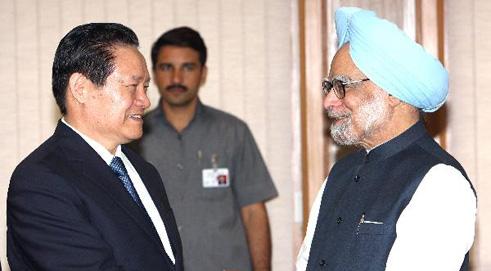
Zhou Yongkang (L), a member of the Standing Committee of the Political Bureau of the Communist Party of China (CPC) Central Committee and secretary of the Political and Legislative Affairs Committee of the CPC Central Committee, meets with Indian Prime Minister Manmohan Singh in New Delhi, capital of India, Nov. 1, 2010. (Xinhua/Yao Dawei)
NEW DELHI, Nov. 1 (Xinhua) -- Zhou Yongkang, a senior official of the Communist Party of China (CPC), on Monday asked for joint efforts to promote China-India relations.
"It is an inevitable trend of history to consolidate and develop the peace and friendship between China and India," Zhou told a seminar on China-India ties.
"We should extract nutrition and wisdom from history to persist in maintaining peace, friendship and mutually beneficial cooperation, and to be good neighbors, good friends and good partners forever," said Zhou, a member of the Standing Committee of the Political Bureau of the CPC Central Committee.
He made a five-point proposal on the further development of China-India relations:
First, both sides should promote political mutual trust.
"We should maintain high-level visits and exchanges, strengthen communication and cooperation between our governments, parties, parliaments and the armed forces, promote cooperation in defense and security, respect and accommodate each other's core interests and major concerns and continue to build up strategic mutual trust," he said.
"By doing so we can further consolidate our strategic cooperative partnership," he added.
Second, the two countries should expand cooperation in economics and trade.
"We should intensify cooperation in areas of resources, energy, agriculture, manufacturing, infrastructure, information technology, etc. and also promote mutual investments," he said.
"We should properly settle problems arising in these fields, reduce restrictive measures against each other to achieve mutually beneficial and win-win results," he added.
Third, China and India should expand friendly exchanges.
"We should further our exchanges and communication in the fields of culture, education, science and technology, promote exchanges between our two countries' academic institutions, youths, as well as press and media, so as to boost mutual understanding and trust between our two peoples," he said.
"We should do more things conducive to the Sino-Indian friendship and create a good atmosphere for the healthy development of bilateral ties."
Fourth, both sides should strengthen international cooperation.
"We should actively coordinate our stances and strengthen cooperation in international affairs and deal together with global issues including climate change, food security, energy and resource security, terrorism, separatism and extremism, so as to safeguard developing countries' interests," he said.
Fifth, the two should strengthen friendly consultation.
For controversial issues and disagreements, the two countries should properly handle them on the basis of mutual respect, consultations on equal basis and mutual understanding and mutual accommodation, so as not to let specific issues affect the overall relations, he said.
This year marks the 60th anniversary of China-India diplomatic relations.
"Looking back into our history of exchanges, we felt that peace and friendship between China and India were deeply rooted in the history and culture of our two countries and among our two peoples," said Zhou, who is also secretary of the Commission for Political and Legal Affairs of the CPC Central Committee.
"It is an established policy and strategic decision of the party and the government of China to develop friendly relations with India," he said.
Zhou arrived here Sunday for a visit. He had visited the tomb of Mahatma Gandhi, leader of India's national independence movement.
Source: Chinaview
Related News
Photos
More>>trade
- Chinese Vice President Arrives in Botswana for Official Visit
- China,Chile Celebrate 40th Anniversary of Diplomatic Ties
- China Vows Greater Efforts to Cope with Climate Change
- China Hopes for Peaceful, Transparent Referendum in south Sudan
- Chinese Vice President Meets with South African President Zuma on Ties,
market
- Chinese Vice Premier Stresses Economic Restructuring, People's Livelihood
- China Values Relations with Singapore: Vice President
- Chinese Tibetan Culture Week Kicks off in Spain
- Former Chinese FM Li Zhaoxing Receives Honorary Doctoral Degree from Hong Kong
- Chinese Premier Meets Vice Chairman of CPPCC National Committee Ho Hau Wah





